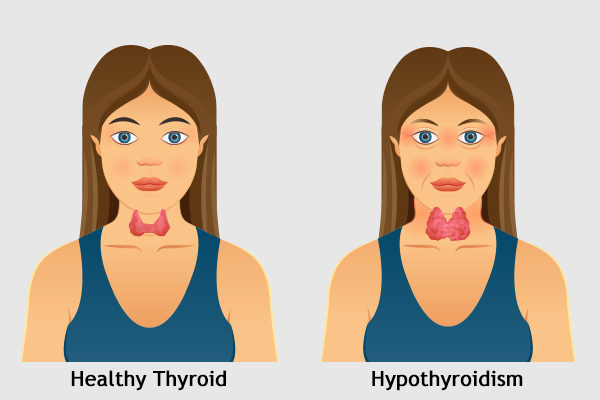Hypothyroidism (Underactive Thyroid): Symptoms, Causes, Treatment
What are the symptoms of hypothyroidism?
Hypothyroidism, or an underactive thyroid gland, occurs when the thyroid gland does not produce enough thyroid hormone. This can lead to a variety of symptoms, including:
- Fatigue: Feeling tired or sluggish, even after getting enough sleep.
- Weight gain: Unexplained weight gain or difficulty losing weight.
- Sensitivity to cold: Feeling cold when others are comfortable or having cold hands and feet.
- Dry skin and hair: Dry, itchy skin and brittle hair or nails.
- Constipation: Difficulty with bowel movements.
- Muscle weakness: Weakness, aches, or stiffness in the muscles, especially in the arms and legs.
- Joint pain: Pain, stiffness, or swelling in the joints.
- Puffy face: Swelling in the face, especially around the eyes.
- Hoarseness: Changes in the voice, such as hoarseness.
- Depression: Feelings of depression or difficulty concentrating.
- Memory problems: Forgetfulness or difficulty remembering things.
- Irregular menstrual periods: Heavier, irregular, or less frequent menstrual periods.
- Slow heart rate: A slow heart rate or heart palpitations.
- Hair loss: Thinning hair or hair loss, especially on the scalp.
- Enlarged thyroid gland (goiter): Swelling in the front of the neck due to an enlarged thyroid gland.
It’s important to note that not everyone with hypothyroidism will experience all of these symptoms, and the severity of symptoms can vary from person to person. If you are experiencing symptoms of hypothyroidism, it’s important to see your healthcare provider for proper evaluation and treatment.
What are the causes of hypothyroidism?
Hypothyroidism can have several causes, including:
- Autoimmune thyroiditis (Hashimoto’s thyroiditis): This is the most common cause of hypothyroidism in developed countries. It is an autoimmune disorder in which the immune system mistakenly attacks the thyroid gland, leading to inflammation and damage to the thyroid tissue.
- Thyroid surgery: If you have surgery to remove all or part of your thyroid gland, you may develop hypothyroidism if the remaining thyroid tissue does not produce enough thyroid hormone.
- Radiation therapy: Radiation treatment to the neck or head, often used to treat certain cancers, can damage the thyroid gland and lead to hypothyroidism.
- Certain medications: Some medications, such as lithium, amiodarone, and interferon alpha, can interfere with thyroid function and lead to hypothyroidism.
- Congenital hypothyroidism: Some babies are born with an underactive thyroid gland due to a problem with thyroid development or function.
- Pituitary gland disorders: Disorders of the pituitary gland, such as pituitary tumors or pituitary surgery, can affect the production of thyroid-stimulating hormone (TSH), which regulates thyroid hormone production.
- Iodine deficiency: Iodine is essential for the production of thyroid hormones. A lack of iodine in the diet can lead to hypothyroidism, although this is rare in developed countries due to the use of iodized salt.
- Inflammatory conditions: Other inflammatory conditions, such as viral infections or certain medications, can temporarily or permanently damage the thyroid gland and lead to hypothyroidism.
- Aging: As people age, the risk of developing hypothyroidism increases, although the exact reason for this is not fully understood.
- Pregnancy: Some women develop hypothyroidism during or after pregnancy, known as postpartum thyroiditis, which may be temporary or permanent.
It’s important to note that the causes of hypothyroidism can vary, and in many cases, the exact cause may not be known. If you are diagnosed with hypothyroidism, your healthcare provider can help determine the underlying cause and recommend appropriate treatment.
What is the treatment for hypothyroidism?
The most common treatment for hypothyroidism is thyroid hormone replacement therapy, which involves taking synthetic thyroid hormone medication to replace the hormone that your thyroid gland is not producing enough of. The goal of treatment is to restore normal thyroid hormone levels in the body and alleviate symptoms. Here are some key points about treatment for hypothyroidism:
- Levothyroxine: The most commonly prescribed medication for hypothyroidism is levothyroxine, a synthetic form of the thyroid hormone thyroxine (T4). It is taken orally, usually once a day on an empty stomach.
- Dosage adjustment: Your healthcare provider will determine the appropriate dosage of levothyroxine based on your age, weight, thyroid hormone levels, and other factors. It may take some time to find the right dosage for you, so regular monitoring of thyroid hormone levels is important.
- Consistent use: It’s important to take levothyroxine consistently and as prescribed. Missing doses or taking the medication inconsistently can affect its effectiveness.
- Monitoring: Regular monitoring of thyroid hormone levels is necessary to ensure that the medication is working effectively and that the dosage is correct. Your healthcare provider may also monitor other thyroid function tests, such as thyroid-stimulating hormone (TSH) levels.
- Lifestyle changes: In addition to medication, making certain lifestyle changes can help manage hypothyroidism. This includes eating a healthy diet, getting regular exercise, managing stress, and avoiding substances that can interfere with thyroid function, such as certain medications and supplements.
- Treatment for underlying causes: If hypothyroidism is caused by an underlying condition, such as Hashimoto’s thyroiditis or iodine deficiency, treatment may also involve addressing the underlying cause.
- Pregnancy: Pregnant women with hypothyroidism may need to adjust their medication dosage under the guidance of their healthcare provider, as thyroid hormone requirements can change during pregnancy.
- Surgery or radioactive iodine: In rare cases, surgery to remove part or all of the thyroid gland or treatment with radioactive iodine may be recommended, especially if other treatments are not effective or if there is a risk of thyroid cancer.
It’s important to work closely with your healthcare provider to determine the most appropriate treatment plan for your individual needs. Regular monitoring and adjustments to your treatment plan may be necessary to ensure that your thyroid hormone levels remain within a normal range.




